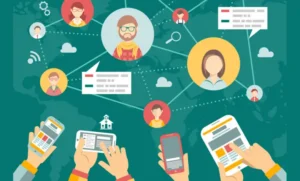Applications of Internet
Applications of Internet have revolutionized the way we live, work, learn, and communicate. What started as a military communication network has grown into a global system that connects billions of users and devices around the world. The applications of the internet are vast, changing how we do everything from shopping and banking to entertainment and business. In this blog post, we’ll explore the applications of the internet and how they impact our daily lives.
1. Communication
The Applications of internet has dramatically transformed communication by providing free or low-cost ways for people to connect. Email was one of the earliest internet applications, allowing virtually instant communication worldwide. Video calling services like Skype and FaceTime have made it possible to communicate face-to-face over the Internet. Messaging apps like WhatsApp and Facebook Messenger allow instant messaging, while social networks like Facebook and Twitter enable public conversations.
The proliferation of internet-based communication tools has made the world feel smaller and more connected. Family and friends across the globe can easily stay in touch through messaging and video chat. Businesses use email and video conferencing to communicate with teams and clients worldwide without the need for expensive long-distance charges.
2. Web Browsing & Information Access
One of the primary uses of the internet is accessing information through web browsers like Chrome, Firefox and Safari. The internet provides endless amounts of information that can be accessed immediately from almost anywhere with an internet connection. People routinely use web browsing to access news, research topics of interest, learn new skills through educational sites like Khan Academy, read reviews before purchasing a product, get driving directions, and more.
Web browsing has made information easily accessible and available to Applications of internet users around the globe. Having the bulk of human knowledge at one’s fingertips has accelerated learning and enabled discoveries.
3. Online Shopping
Ecommerce sites like Amazon and eBay have transformed how consumers purchase everything from clothing to furniture. Online shopping provides unparalleled access to goods and services that may not be available locally. It also allows consumers to easily compare prices between multiple retailers through sites like Google Shopping.
The benefits of online shopping include convenience, competitive pricing, broader selection, ability to purchase goods from other countries, and the ability to send gifts more easily. Online shopping has grown rapidly over the past two decades.

4. Real-Time Updates & Information Sharing
Before the Applications of internet, print newspapers, radio and television were the primary medium for obtaining news. The internet has enabled people to access real-time updates and breaking news stories as they occur. News sites are able to update stories throughout the day, keeping the public constantly informed. Citizens can even report live events as they happen through social media, providing on-the-ground perspectives.
The internet also enables governments, businesses and public figures to share information and updates in real-time. Alarm systems and internet-connected cameras can live-stream crime events as they occur. Meteorologists have greatly improved forecasting accuracy by leveraging real-time weather data. Stock trading has been transformed through real-time stock tickers and trading platforms.
5. Social Media
Social media has become a primary way that people interact online. Platforms like Facebook, Instagram, Twitter, Snapchat and TikTok allow users across the globe to share updates, photos, videos, and conversations. People can interact with friends, family, strangers, politicians, celebrities and businesses through social media. These platforms have created online communities where people can gather based on shared interests.
Social media has also enabled new forms of political engagement, social movements and activism. Hashtags on platforms like Twitter allow users to easily follow and join in global conversations. Social media provides a way for people to stay socially connected even when they live far apart. However, social media can also facilitate the spread of misinformation and impact mental health if not used responsibly. Overall, social media enabled by Applications of internet applications has profoundly shaped modern culture.
6. Job Search & Remote Work
The internet provides new opportunities for people to find work and earn income. Job search sites like LinkedIn, Monster and Indeed allow people to easily search for and apply for jobs across the country from their home. Applicants can also use sites like Glassdoor to research company reviews and salaries as part of their job search process.
Many jobs today can be done entirely remotely through the internet. Workers can use business productivity software like Slack, Trello and Asana to collaborate with teams worldwide through the internet. Video conferencing apps enable remote meetings.
7. Education & Learning
The internet has created revolutionary changes and opportunities in education. It has enabled the widespread availability of online education through platforms like Coursera, Udemy, edX and Khan Academy. Massive open online courses (MOOCs) have made courses from leading universities around the world accessible to anyone with an Apllications of internet connection. K-12 schools utilize online learning software and educational apps to augment in-classroom teaching.
Students can also easily access digital textbooks, papers and journals for research online through library databases and search engines. The internet provides unlimited educational content for learning and opens doors for people everywhere to access education.
8. Travel & Transportation
The internet has heavily influenced transportation and tourism. People routinely use sites like Expedia, Priceline and Kayak to book flights, hotels and rental cars for travel. Review sites like TripAdvisor and Yelp help travelers research destinations and businesses. Smartphone apps like Google Maps and Waze provide real-time navigation, traffic updates and transit schedules.
Ridesharing services like Uber rely on internet-enabled mobile apps to coordinate transportation. Many airlines provide internet access on flights for entertainment and productivity.
9. Stock Trading & Finance
The internet has also had substantial impacts on trading, banking and finance. Online brokers like E*Trade and Charles Schwab allow individuals to trade stocks online securely. People can manage their finances and bank accounts through internet banking and finance apps using any internet-connected device.
The internet increases access to financial services by enabling online lending, banking and investment platforms. Algorithmic high-frequency trading relies on ultra-fast internet connections to trade based on market fluctuations.
10. Video Conferencing
Finally, video conferencing tools like Zoom, Skype, FaceTime and Google Meet have become vital business and personal communication tools powered by the internet. These services enable meetings, interviews, conferences and hangouts with two or more participants through video chat. This allows for productive remote collaboration and meetings when in-person gatherings are not possible.
Video conferencing has enabled remote work and virtual offices to become viable for many companies. Families and friends also use video chat services to connect face-to-face when separated geographically.
Positive and Negative Impact of the Internet
While the internet has brought many benefits, it also comes with drawbacks. On the positive side, the internet has enabled:
- Greater access to information, education and opportunities
- More connectivity among people worldwide
- Innovation through digital tools and new business models
- Economic growth through ecommerce and internet-based businesses
However, some of the potential negative impacts include:
- Privacy and security risks from hacking and data collection
- Exposure to misinformation, harmful content and cyberbullying
- Tech addiction and excessive internet or social media usage
- Greater isolation and less in-person interaction
There are also arguments around the internet decreasing attention spans, damaging mental health, and enabling new forms of crime. The positives and negatives clearly demonstrate the immense power and influence, both beneficial and detrimental, that the internet wields through its many applications.
Key Services Enabled by Internet Applications
Some of the key services that internet applications have enabled include:
- Instant messaging and video calls – Services like WhatsApp, FaceTime, Skype and Facebook Messenger have provided free or low-cost instant communication.
- Ride sharing – Apps like Uber and Lyft use GPS and internet communication to coordinate transportation through a network of drivers.
- Crowdsourcing – Platforms like Kickstarter and GoFundMe utilize the internet to obtain funding from a large pool of individuals.
- Streaming entertainment – Services like Netflix, Hulu, Disney+, and Spotify leverage the internet to provide on-demand video and music.
- Home automation – Internet-connected devices permit controlling security cameras, lights, appliances from anywhere with an internet connection.
- Online file storage/sharing – Cloud-based services like Dropbox and Google Drive allow accessing files across devices and sharing large documents.
- Social media – Platforms like Facebook and Twitter rely on internet applications for sharing text, images, and video and interacting with other users.
- AI Chatbot- Google Bard, OpenAI Chatgpt, Bing Chat
Key Advantages of Internet Applications
There are several advantages that internet applications provide over traditional non-networked applications:

- Accessibility – Internet applications can be accessed from any internet-connected device anywhere, enabling remote usage.
- Real-time updates – Data and content can be updated continuously, allowing internet applications to provide the latest information.
- Scalability – Internet application infrastructure can scale to support large userbases more easily than traditional applications
Examples of Internet Applications for Remote Work and Collaboration
The internet has enabled new forms of remote work, collaboration and communication through tools like:
- Video conferencing – Apps like Zoom, Google Meet, Microsoft Teams facilitate meetings and collaboration via video chat.
- Cloud computing – Platforms like AWS provide on-demand cloud computing services for remote work.
- Business chat tools – Apps like Slack and Teams allow team communication through instant messaging.
- Remote access software – Applications like LogMeIn provide remote access to a computer or network for telecommuting.
- Virtual whiteboards – Services like Miro create online collaborative whiteboards for brainstorming remotely.
Some Existing Internet Applications
Some of the most popular existing internet applications include:
- Social networks – Facebook, Instagram, Twitter, LinkedIn, Pinterest, Reddit
- Messaging – WhatsApp, Facebook Messenger, Skype, Discord
- Streaming entertainment – Netflix, Spotify, YouTube, SoundCloud
- Ridesharing – Uber, Lyft, Ola
- Ecommerce – Amazon, eBay, Etsy, Shopify
- Food delivery – Grub hub, Door Dash, Uber Eats
- ** Crowdsourcing** – Kickstarter, Patreon, GoFundMe
Writing Your Own Internet Application
Creating your own internet application has been greatly simplified by modern web development frameworks and cloud computing platforms. Here is an overview of how to get started:
- Determine the purpose and core functionality needed for your web app.
- Choose a programming language like JavaScript, Python, PHP, etc. and web framework like React, Angular, Django, or Ruby on Rails.
- Set up a web server either on your own hardware or using a cloud platform like AWS, Google Cloud, or Azure.
- Use a database like MySQL, MongoDB, or PostgreSQL to store your app’s data and user information.
- Write clean, well-organized code for your backend logic and APIs along with frontend user interfaces.
Following modern web development best practices, even those without extensive coding experience can build their own powerful internet applications. The possibilities are endless!
Conclusion of Applications of Internet
In summary, internet applications have fundamentally transformed how we communicate, work, learn, shop and go about our daily lives. The impacts span from enhancing business efficiency through tools like video conferencing and cloud storage, to providing access to goods through ecommerce, to enabling global friendship and knowledge exchange through social media. While there are some negatives like privacy concerns, the many benefits have drastically improved quality of life around the world. We are still only scratching the surface of the internet’s potential. As connectivity and technology continue improving, so will the applications that harness the power of the internet. The future promises even more rapid innovation and progress thanks to the platform provided by the internet and web.
Now, understanding this concept is simple and entertaining on Hasons. By using Hasons website you can always stay one step ahead in your job, business or studies by purchasing New Age Desktops and All in One Desktops, i3 Intel Core Processor Desktop starting from 15000/-. Monitors, CPUs, Gaming Desktop are also available. Register on Hasons and order your Tech Partner Now. Get exciting offers and benefits on your every purchase. Contact us so our support team will guide you in purchasing your right Tech Partner.
 Desktop Computer Set under 16k, Limited Edition!
Desktop Computer Set under 16k, Limited Edition!
I3 processor 8GB RAM 4th gen/500 GB HDD/ 128 SSD Wired Keyboard and Mouse/ Windows 10/Black, screen 18.5
Call 9766122859 to place an offline order and receive FLAT 500/- DISCOUNT
| If you are reading Application of Internet then also check our other blogs: | |
| Computer Chart | Types of Virtual Reality |
| Characteristics of Cloud Computing | Edge Computing |
Application of Internet
- How does an internet application work?An internet application works by having the application logic and data hosted remotely on servers, while users access it through a web browser or mobile app. The client sends requests to the server over the internet, the server processes the requests and performs operations on the back-end, and sends responses back to the client to display. This allows the processing to happen on servers rather than the user's device.
- What are three common uses of the internet?Three common uses of the internet are:
- Web browsing - Accessing information through websites and search engines.
- Email - Electronic communication with colleagues, friends and family.
- Entertainment - Streaming music, movies, gaming, and social media.
- What are the three features of Internet applications?Three key features of internet applications are:
- Accessibility - They can be accessed globally from any internet-connected device.
- Real-time updates - They can dynamically update content and data on the fly.
- Collaboration - They allow simultaneous collaboration between multiple geographically dispersed users.
